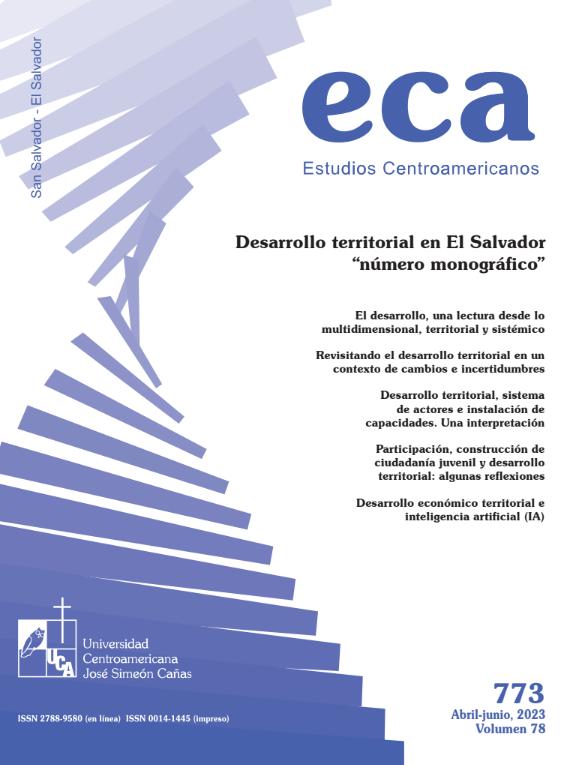Resumen
En este artículo se hace una interpretación específica de lo que se entiende por “desarrollo territorial”. Se parte no solo de una específica comprensión de lo que es desarrollo – o debería ser – sino también de posibles interpretaciones del agregado “territorial” al desarrollo. Se concluye que el concepto y realidad del “sistema de actores” es el elemento clave de la comprensión operativa del desarrollo territorial. A partir de ello se extraen consecuencias operativas, éticas y de instalación de capacidades que hagan posible que el “sistema de actores” se convierta en sujeto histórico, es decir autores, actores y agentes de su propio destino.
ECA Estudios Centroamericanos, Vol. 78, No. 773, 2023: 57-73.
Referencias
Adams, T. (2009). La violencia crónica y su reproducción. Wilson Center, 2009.
Alburquerque, F. y Pérez Rozzi, S. (2013). El desarrollo territorial: enfoque, contenido y políticas. Conectadel. Bloch, E. (2007). El principio esperanza (I, II y III.). Trotta.
Boisier, S. (1999). Teorías y metáforas del desarrollo territorial. CEPAL, Santiago.
Botcharova, O. (2001). Implementation of Track Two Diplomacy. Developing a Model of Forgiveness. En Helmik, R. y Petersen, R. (Eds.), Forgiveness and Reconciliation: Religion, Public Policy & Conflict Transformation (pp. 279–304). Templeton Foundation Press.
Cabarrús, C. (1983). Génesis de una revolución. Ediciones de la Casa Chata.
Cardenal, R. (1985). Historia de una esperanza. UCA Editores.
Catholic Relief Services. (2017). The ties that bind. Building social cohesion in divided communities. CRS. https://reliefweb.int/attachments/007d0e57-71f7-3766-ace3-112b02b5dd4a/crs-ties-rev-08-03-2017-web.pdf
Costamagna, P. y Larrea, M. (2017). Actores facilitadores del desarrollo territorial. Deusto.
Curle, A. (1978). Conflictividad y pacificación. Herder.
Ellacuría, I. (1990). Filosofía de la realidad histórica. UCA Editores.
Ellacuría, I. (2001a). “Esquema general de la antropología zubiriana”, en Escritos Filosóficos II, UCA Editores, 285-364.
Ellacuría, I. (2001b). “Persona y Comunidad”, en Escritos Filosóficos III, UCA Editores, 65-114.
Ellacuría, I. (2001c). “Función liberadora de la filosofía”, Escritos Políticos I, UCA Editores, 63-92.
Escobar, A. (2012). La invención del desarrollo. Universidad del Cauca.
Freire, P. (1972). Pedagogía del oprimido. Nueva Tierra.
Foucault, M. (2005). Una introducción a la vida no fascista. Perspectivas Metodológicas. 5(5). https://revistas.unla.edu.ar/epistemologia/article/view/550/587
Hicks, D. (2011). Dignity. Yale University Press Lang, M. y Mokrani, D. (Eds.). (2011). Más allá del desarrollo. Abya Yala. Latour, B. (1995). ¿Tienen historia los objetos? El encuentro de Pasteur y de Whitehead en un baño de ácido láctico. Isegoría, (12), 92–109. https://doi.org/10.3989/isegoria.1995.i12.242
Latour, B. (2007). Nunca fuimos modernos. Siglo XXI.

Esta obra está bajo una licencia internacional Creative Commons Atribución-NoComercial-SinDerivadas 4.0.
Derechos de autor 2023 ECA. Estudios Centroamericanos






